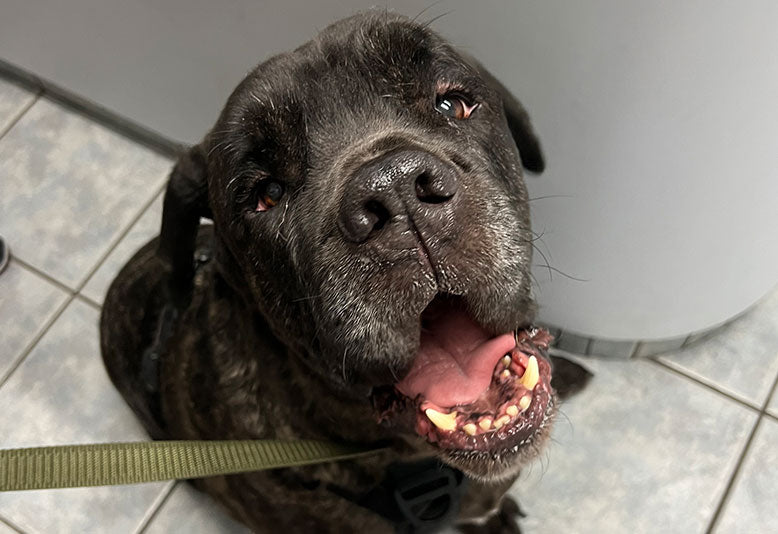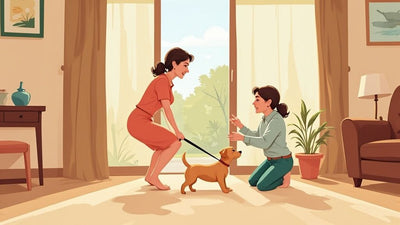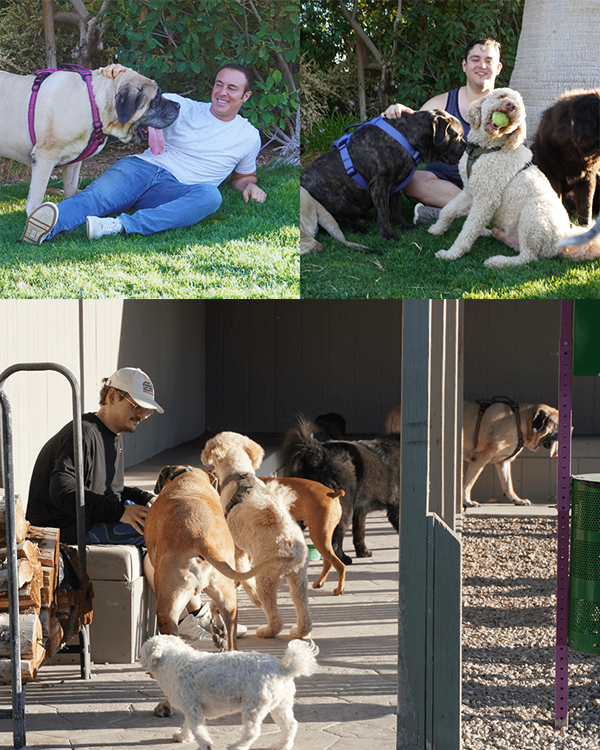Dog Dementia: The Complete Guide to Canine Cognitive Dysfunction (2025)
Supporting Your Senior Dog's Cognitive Health: A Science-Based Guide
When your senior dog pauses at their water bowl, seemingly forgetting why they're there, it's a moment that tugs at every pet parent's heart. You're not alone—research shows that up to 68% of dogs over 15 years old experience age-related cognitive changes. Understanding these changes and knowing how to support your dog through them can make a significant difference in their quality of life.
Table of Contents
- Understanding Brain Aging in Dogs
- Recognizing Early Signs
- The DISHAA Assessment Framework
- Stages of Cognitive Change
- Nutritional Support Strategies
- Environmental Modifications
- Daily Management Routines
- Managing Nighttime Challenges
- Working with Your Veterinarian
- Quality of Life Assessment
- How NeuroChew Can Help
- Frequently Asked Questions
Get Your FREE Dog Brain Health Guide

Get instant FREE access to today's top ways to help your best friend live a longer, healthier, happier life.
- 39 value-packed pages of expert insights
- Early-detection tips for cognitive decline
- Top brain-boosting superfoods
- Vet-approved mental sharpness strategies
- Fun IQ tests for your dog
Understanding Brain Aging in Dogs
The canine brain, containing approximately 530 million cortical neurons, undergoes natural changes as dogs age. These changes parallel many aspects of human aging, affecting memory, learning, and behavior. Understanding what happens at the biological level helps us better support our senior companions.
Key Brain Changes During Aging
- Protein accumulation: Beta-amyloid plaques may develop in the brain, particularly in the prefrontal cortex
- Metabolic changes: Brain glucose metabolism becomes less efficient
- Structural changes: Some degree of brain atrophy may occur, especially in memory-related areas
- Vascular changes: Blood flow to the brain may decrease over time
- Neurotransmitter alterations: Changes in brain chemistry can affect mood and cognition
Age-Related Cognitive Changes: The Statistics
- 28% of dogs aged 11-12 show at least one sign of cognitive change
- 68% of dogs aged 15-16 display multiple behavioral changes
- 85% of cases may go unrecognized as "just old age"
- 52% increased odds of cognitive changes with each year of aging
- Only 1.8% of owners report concerns to their veterinarian
These statistics underscore why awareness and proactive care are essential. While aging is natural and inevitable, understanding these changes helps us provide better support for our senior dogs.
Recognizing Early Signs of Cognitive Change
Early detection of cognitive changes allows for better management and can potentially slow progression. Unlike acute illnesses with obvious symptoms, cognitive changes develop gradually, making them easy to overlook.
Common Early Warning Signs
Spatial Confusion
- Staring at walls or into space for extended periods
- Getting "stuck" in corners or behind furniture
- Difficulty navigating familiar spaces
- Standing on the wrong side of doors
- Seeming lost in familiar environments
Behavioral Changes
- Decreased interest in greeting family members
- Changes in interaction with other pets
- New fears or anxieties about familiar things
- Reduced interest in play or favorite activities
- Changes in appetite or eating habits
Sleep Pattern Disruptions
- Restlessness or pacing at night
- Increased daytime sleeping
- Confusion about day/night cycles
- Vocalization during nighttime hours
- Difficulty settling down for sleep
The DISHAA Assessment Framework
Veterinarians use the DISHAA framework as a standardized tool to assess cognitive changes in dogs. This systematic approach ensures all relevant behavioral domains are evaluated.
DISHAA Components
D - Disorientation: Confusion about surroundings, getting lost in familiar places, or standing in unusual locations. Dogs may appear to "forget" the layout of their home.
I - Interactions: Changes in social behavior with humans or other pets. This can include decreased interest in interaction or increased dependency and clingy behavior.
S - Sleep-Wake Cycle: Disruptions to normal sleep patterns, including nighttime waking, pacing, or vocalization. Many dogs experience a reversal of their sleep-wake cycle.
H - House Soiling: Loss of house training, elimination in inappropriate places, or loss of signaling behaviors when they need to go outside.
A - Activity Changes: Alterations in activity levels, including repetitive behaviors, aimless wandering, or decreased interest in previously enjoyed activities.
A - Anxiety: New or increased anxiety, including separation anxiety, fear of familiar objects, or general restlessness without apparent cause.
Using DISHAA at Home
- Rate each category on a scale of 0-3 (0=none, 3=severe)
- Document specific examples of behaviors
- Track changes over time
- Share findings with your veterinarian
Stages of Cognitive Change
Cognitive changes typically progress through identifiable stages, though the rate varies significantly between individual dogs.
Stage 1: Mild Cognitive Changes
Duration: Often months to years
Characteristics:
- Subtle behavioral changes
- Occasional confusion or disorientation
- Minor sleep pattern alterations
- Slight decrease in activity
Management Focus: This is the optimal time to begin supportive care, including nutritional support, environmental enrichment, and maintaining regular routines. Early intervention at this stage often yields the best results.
Stage 2: Moderate Cognitive Changes
Duration: Variable, often months to years
Characteristics:
- More frequent disorientation episodes
- Noticeable changes in social interactions
- Regular sleep disturbances
- Some loss of learned behaviors
- Increased anxiety or restlessness
Management Focus: Comprehensive support including environmental modifications, structured routines, and potentially veterinary interventions become important at this stage.
Stage 3: Advanced Cognitive Changes
Duration: Variable
Characteristics:
- Frequent or constant confusion
- Significant personality changes
- Loss of recognition of familiar people or pets
- Major disruption to sleep-wake cycles
- Loss of house training
Management Focus: Quality of life becomes the primary concern, with emphasis on comfort, safety, and maintaining dignity for the dog.
Nutritional Support Strategies
Proper nutrition plays a crucial role in supporting brain health throughout your dog's life. While no supplement can reverse aging, appropriate nutritional support may help maintain normal cognitive function.
Key Nutrients for Brain Health Support
Omega-3 Fatty Acids (DHA and EPA)
Essential fatty acids that are important components of brain cell membranes. They support normal inflammatory response and play a role in maintaining neural health.
- Sources: Fish oil, algae-based supplements
- Function: Support normal brain cell membrane structure
- Quality matters: Look for purified, tested sources
Antioxidants
Help protect cells from oxidative stress, a normal part of aging. A combination of antioxidants may provide broader support than single nutrients.
- Vitamin E: Fat-soluble antioxidant supporting cell membranes
- Vitamin C: Water-soluble antioxidant working synergistically with vitamin E
- Selenium: Trace mineral supporting antioxidant enzyme function
Medium Chain Triglycerides (MCTs)
Provide an alternative energy source for brain cells. Research has shown interest in their potential role in supporting cognitive function.
- Source: Coconut oil, specialized MCT supplements
- Function: Readily available energy for brain cells
- Introduction: Start gradually to avoid digestive upset
B-Complex Vitamins
Play important roles in energy metabolism and neurotransmitter production. Senior dogs may benefit from adequate B vitamin intake.
- B6, B12, Folate: Support normal homocysteine metabolism
- Function: Important for energy production and neural function
Environmental Modifications
Creating a senior-friendly environment can significantly improve your dog's quality of life and reduce confusion-related stress.
Navigation Assistance
- Lighting: Add nightlights along common pathways
- Visual cues: Use contrasting tape to mark stairs and doorways
- Clear paths: Remove clutter and ensure wide walkways
- Consistent layout: Avoid rearranging furniture
Comfort Zones
- Multiple rest areas: Provide comfortable beds in several locations
- Easy access: Ensure food, water, and beds are easily reachable
- Temperature control: Maintain comfortable temperatures
- Quiet spaces: Create retreat areas away from noise
Safety Considerations
- Baby gates: Prevent access to stairs or dangerous areas
- Non-slip surfaces: Add rugs on slippery floors
- Ramps: Consider for easier access to favorite spots
- Monitoring: Use pet cameras when you're away
Daily Management Routines
Consistency and routine become increasingly important for senior dogs experiencing cognitive changes. A structured schedule provides security and reduces anxiety.
Sample Daily Schedule
Morning (6:00 AM - 12:00 PM)
- 6:00 AM - Morning bathroom break
- 7:00 AM - Breakfast with any supplements
- 8:00 AM - Gentle morning walk
- 9:00 AM - Quiet rest time
- 11:00 AM - Brief mental stimulation activity
Afternoon (12:00 PM - 6:00 PM)
- 12:00 PM - Midday bathroom break
- 1:00 PM - Light lunch or treat
- 2:00 PM - Rest period
- 4:00 PM - Gentle interaction time
- 5:00 PM - Evening bathroom break
Evening (6:00 PM - 10:00 PM)
- 6:00 PM - Dinner with supplements
- 7:00 PM - Family time
- 8:00 PM - Final walk
- 9:00 PM - Wind-down routine
- 10:00 PM - Bedtime
Routine Tips
- Keep meal times consistent
- Maintain regular bathroom breaks
- Include gentle mental stimulation
- Create calming bedtime rituals
- Be flexible based on your dog's needs

Support Your Dog's Brain Health with NeuroChew™
As mentioned in this article, NeuroChew is the first dog chew designed to support both cognitive function and healthy circulation. Perfect for dogs showing early signs of cognitive decline or for proactive brain health support.
Managing Nighttime Challenges
Sleep disturbances affect up to 60% of dogs with cognitive changes and can be challenging for the entire household.
Common Nighttime Issues
- Pacing or restlessness
- Vocalization (barking, whining)
- Confusion or disorientation
- Inability to settle
- Reversed sleep-wake cycles
Strategies for Better Nights
Environmental Modifications
- Use dim nightlights for navigation
- Consider white noise machines
- Maintain comfortable temperature (68-72°F)
- Provide supportive bedding
Behavioral Strategies
- Ensure adequate daytime activity
- Avoid vigorous exercise near bedtime
- Final bathroom break before bed
- Calming activities before sleep
- Consistent bedtime routine
Working with Your Veterinarian
Your veterinarian is your most important partner in supporting your senior dog's health. Regular check-ups become increasingly crucial as dogs age.
Preparing for Your Visit
Before the Appointment
- Keep a detailed behavior log
- Record concerning behaviors on video
- List all medications and supplements
- Write down questions in advance
During the Visit
- Provide specific examples of changes
- Ask about diagnostic options
- Discuss management strategies
- Schedule follow-up visits
- Clarify warning signs requiring immediate attention
Diagnostic Considerations
Your veterinarian may recommend:
- Comprehensive physical examination
- Blood work to rule out metabolic conditions
- Urinalysis to check for infections
- Cognitive assessment using validated tools
- Advanced imaging if clinically indicated
Quality of Life Assessment
As our dogs age, maintaining quality of life becomes our primary goal. Regular assessment helps guide care decisions.
The HHHHHMM Scale
This validated scale helps assess quality of life objectively. Rate each factor from 1-10 (10 being ideal):
- H - Hurt: Is pain adequately controlled?
- H - Hunger: Is the dog eating enough?
- H - Hydration: Is the dog adequately hydrated?
- H - Hygiene: Can the dog be kept clean?
- H - Happiness: Does the dog express joy?
- M - Mobility: Can the dog move adequately?
- M - More good days: Are there more good days than bad?
Interpretation: A total score above 35 suggests acceptable quality of life. Scores below 35 warrant discussion with your veterinarian.

Real Results: How NeuroChew Helped Brutus Regain His Mental Clarity
Brutus was getting disoriented at night. After starting NeuroChew, he's more happy during the day and steady at night. He's back to his old self!
How NeuroChew Can Help
At FureverActive Ranch, we understand the challenges of supporting senior dogs. That's why we developed NeuroChew, a comprehensive nutritional supplement designed to support normal brain function and healthy circulation in aging dogs.
About NeuroChew
NeuroChew is formulated with carefully selected ingredients to provide nutritional support:
- Comprehensive formula: Combines nutrients that support normal brain function
- Quality manufacturing: Made in the USA with tested ingredients
- Easy administration: Palatable chews dogs enjoy
- Size-appropriate dosing: Clear guidelines based on weight
- 60-day guarantee: Try risk-free with our satisfaction guarantee
Support Your Senior Dog's Brain Health
Learn how NeuroChew can be part of your dog's wellness routine.
Learn About NeuroChew Our GuaranteeFrequently Asked Questions
How can I tell if my dog's changes are normal aging or something more serious?
Normal aging typically involves gradual slowing and occasional forgetfulness. Persistent confusion, significant personality changes, or disruption of daily activities warrant veterinary evaluation. The DISHAA framework can help identify concerning patterns.
What role does nutrition play in brain health?
Proper nutrition provides building blocks for normal brain function. While nutrition cannot prevent aging, a balanced diet with appropriate nutrients supports overall health. Discuss specific needs with your veterinarian.
Are certain breeds more prone to cognitive changes?
Cognitive changes can affect any breed. Some studies suggest variations in prevalence, likely related to overall lifespan differences. Individual health history and genetics play important roles.
Should I consider supplements for my senior dog?
Nutritional supplements may support overall health in senior dogs. Always consult your veterinarian before starting new supplements. They can recommend appropriate options based on your dog's specific needs.
How often should senior dogs see the veterinarian?
Most veterinarians recommend bi-annual check-ups for senior dogs (typically over 7 years old). Dogs showing cognitive or behavioral changes may benefit from more frequent visits.
Can cognitive changes be prevented?
While aging cannot be prevented, certain lifestyle factors may support cognitive health: maintaining appropriate physical activity, providing mental stimulation, ensuring proper nutrition, managing chronic conditions, and maintaining social interaction.
Taking Action: Your 30-Day Plan
Week 1: Assessment and Documentation
- Begin keeping a behavior journal
- Document concerning behaviors
- Take videos of unusual behaviors
- Schedule veterinary appointment if needed
- Assess home environment
Week 2: Environmental Modifications
- Add nightlights to pathways
- Create clear navigation routes
- Ensure easy access to essentials
- Remove hazards
- Set up consistent sleeping area
Week 3: Routine Establishment
- Implement consistent meal times
- Establish regular bathroom breaks
- Add mental stimulation activities
- Create calming bedtime routine
- Monitor and adjust
Week 4: Evaluation and Adjustment
- Review behavior journal
- Assess which changes helped
- Adjust routines based on observations
- Follow up with veterinarian
- Plan ongoing strategies

"I support NeuroChew because it's the first dog chew that supports both brain function and healthy circulation!"
Dr. Ruth Roberts
DVM, CVFT
Share This Article

Support Your Dog's Brain Health with NeuroChew™
The first dog chew that supports both brain function and healthy circulation. Perfect for dogs of all ages.
- Enhances cognitive function & mental clarity
- Reduces anxiety without sedation
- Supports healthy blood circulation
- Made in USA with natural ingredients
60-Day Money-Back Guarantee • Free Shipping








